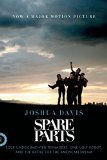Summary | Excerpt | Reading Guide | Reviews | Beyond the Book | Readalikes | Genres & Themes | Author Bio
Four Undocumented Teenagers, One Ugly Robot, and the Battle for the American Dream
by Joshua Davis

Critics' Opinion:
Readers' Opinion:
First Published:
Dec 2014, 240 pages
Paperback:
Dec 2014, 240 pages
 Book Reviewed by:
Book Reviewed by:
Rory L. Aronsky
Buy This Book
After school, Lorenzo started helping his godfather fix cars. Hugo Ceballos lived with the Santillan family and had set up an informal business in their driveway; anybody with car problems could pull in and Hugo would pop the hood, figure out what was wrong, and fix it right there.
Hugo wouldn't let Lorenzo do much more than clean the tools with a rag damp with gasoline. It gave Lorenzo an excuse to stand beside the cars and watch. He learned that when you jack up a car, you should position a tire on the ground beside you when you slide under the vehicle. That way, if the jack fails, the car will land on the tire, not you.
That's a badass idea, Lorenzo thought.
Lorenzo wanted to do more, but Hugo didn't let him. So Lorenzo hovered on the periphery, cleaning the occasional tool and watching closely as Jose, his older brother, helped. Hugo explained to Jose that it was important to keep track of all your parts. "Anything you take off a car, remember where it goes," he told Lorenzo's brother. When Hugo installed a rebuilt engine, Lorenzo stood a few feet back and listened as Hugo showed Jose how to use a torque wrench to tighten the bolts. Lorenzo listened carefully and tried to get as close as he could to the car. He had to be careful though; if he got in Hugo's or Jose's way, he'd get yelled at and told to go inside.
The chief lesson Lorenzo learned was that it was important to be creative. Hugo wasn't running a normal mechanic's shop, with a wall full of tools and shelves filled with supplies. He had little money, a small set of hand tools, and his ingenuity. To survive, he had to come up with fresh ideas and adapt.
Lorenzo took that to heart. He didn't fit into white American culture and couldn't find his place in the immigrant community. Even band—the standard home for high school misfits—didn't work for him. But his days looking over Hugo's shoulder in the driveway had taught him to think outside the norm. In the driveway, an unusual idea wasn't necessarily bad. In fact, it might be the only solution.
AT ONE TIME, Carl Hayden was a well-regarded school; it even had its own off-site equestrian program. Students could ride horses in an indoor facility so they wouldn't get too hot in the desert heat. The school district even built a rodeo ring for teens. It was meant to be a school for white kids.
It's not that way anymore. Now the neighborhood around the school has an abandoned, overlooked feel. Some of the roads are still unpaved dirt. Junk-food wrappers and diapers lie in the desiccated weeds on the side of the road. At the school entrance on West Roosevelt, security guards, two squad cars, and a handful of cops watch teenagers file past a sign that reads, CARL HAYDEN COMMUNITY HIGH SCHOOL: THE PRIDE'S INSIDE.
There certainly isn't a lot of pride on the outside. The school buildings are mostly drab, late-1950s-era boxes. The front lawn is nothing but brown scrub and patches of dirt. The class photos beside the principal's office tell the story of the past four decades. In 1965, the students were nearly all white, wearing blazers, ties, and long skirts. Now the school is 92 percent Hispanic. Drooping, baggy shorts and crisply ironed denim shirts are the norm.
The current student body reflects the transformation of Phoenix. The city was founded in 1868 by Jack Swilling, a morphine-addicted former Confederate officer. Swilling had come to Arizona seeking gold but ended up falling in love with a Mexican woman instead. Trinidad Mejia Escalante, a seventeen-year-old from Hermosillo, Mexico, was visiting relatives in southern Arizona when she encountered Swilling. Escalante's mother didn't approve of the drug-addled soldier, but the young lady was smitten and eloped.
Soon after their marriage, the Swillings built a canal near the Salt River, a meager flow of water that spills out of the burnt-umber Mazatzal Mountains into a broad, flat valley. They planted corn, sorghum, and even a vineyard and discovered that the land was productive. The winters were warm and the soil rich. Before long, the Swilling Canal drew other settlers, one of whom dubbed the new community Phoenix. This referred to the ancient, ruined Indian canals that still ran across the land, the remnants of a lost civilization that was now rising again as a result of the marriage of an American man and Mexican woman.
Excerpted from Spare Parts by Lindsey Davis. Copyright © 2014 by Lindsey Davis. Excerpted by permission of Farrar, Straus & Giroux. All rights reserved. No part of this excerpt may be reproduced or reprinted without permission in writing from the publisher.




When you are growing up there are two institutional places that affect you most powerfully: the church, which ...
Click Here to find out who said this, as well as discovering other famous literary quotes!
Your guide toexceptional books
BookBrowse seeks out and recommends the best in contemporary fiction and nonfiction—books that not only engage and entertain but also deepen our understanding of ourselves and the world around us.